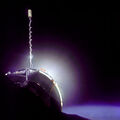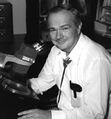Template:Selected anniversaries/July 18: Difference between revisions
No edit summary |
No edit summary |
||
| (3 intermediate revisions by the same user not shown) | |||
| Line 4: | Line 4: | ||
||1742: Abraham Sharp dies ... mathematician and astronomer. Pic. | ||1742: Abraham Sharp dies ... mathematician and astronomer. Pic. | ||
||1768: Amateur mathematician Jean-Robert Argand born. In 1806, while managing a bookstore in Paris, he published the idea of geometrical interpretation of complex numbers known as the Argand diagram and is known for the first rigorous proof of the Fundamental Theorem of Algebra. Pic search: https://en.wikipedia.org/wiki/Jean-Robert_Argand | |||
||1807: Thomas Jones dies ... Head Tutor at Trinity College, Cambridge for twenty years and an outstanding teacher of mathematics. Pic. | ||1807: Thomas Jones dies ... Head Tutor at Trinity College, Cambridge for twenty years and an outstanding teacher of mathematics. Pic. | ||
| Line 20: | Line 22: | ||
||1900: Johan Gustav Christoffer Thorsager Kjeldahl dies ... chemist who developed a method for determining the amount of nitrogen in certain organic compounds using a laboratory technique which was named the Kjeldahl method after him. Pic. | ||1900: Johan Gustav Christoffer Thorsager Kjeldahl dies ... chemist who developed a method for determining the amount of nitrogen in certain organic compounds using a laboratory technique which was named the Kjeldahl method after him. Pic. | ||
||1900: U.S. Army combat historian Samuel Lyman Atwood Marshall born. Known professionally as S. L. A. Marshall, and nicknamed "Slam" (the combination of all four of his initials), he authored some 30 books about warfare, including ''Pork Chop Hill: The American Fighting Man in Action'', which was made into a film of the same name. However, his legacy is mired in scandal, as he lied about his involvement in the primary events he wrote about. Pic. | |||
||1906: Edwin Ford Beckenbach born ... mathematician. Pic. | ||1906: Edwin Ford Beckenbach born ... mathematician. Pic. | ||
| Line 34: | Line 38: | ||
||1927: Harden M. McConnell born ... chemist and academic ... contributed to the understanding of the relation between molecular electronic structure and electron and nuclear magnetic resonance spectra during the period of 1955 through 1965. After that, he developed the technique of spin-labels, whereby electron and nuclear magnetic resonance spectra can be used to study the structure and kinetics of proteins and membranes. Pic search: https://www.google.com/search?q=harden+m.+mcconnell | ||1927: Harden M. McConnell born ... chemist and academic ... contributed to the understanding of the relation between molecular electronic structure and electron and nuclear magnetic resonance spectra during the period of 1955 through 1965. After that, he developed the technique of spin-labels, whereby electron and nuclear magnetic resonance spectra can be used to study the structure and kinetics of proteins and membranes. Pic search: https://www.google.com/search?q=harden+m.+mcconnell | ||
||1931: Oskar Minkowski dies ... biologist and academic ... research on diabetes. Pic. | |||
||1937: Hunter S. Thompson born ... journalist and author. Pic. | ||1937: Hunter S. Thompson born ... journalist and author. Pic. | ||
| Line 40: | Line 46: | ||
||1942: The Germans test fly the Messerschmitt Me 262 using its jet engines for the first time. | ||1942: The Germans test fly the Messerschmitt Me 262 using its jet engines for the first time. | ||
||1962: Eugene Houdry dies ... mechanical engineer and inventor. Houdry invented catalytic cracking of petroleum feed stocks. Pic. | ||1962: Eugene Houdry dies ... mechanical engineer and inventor. Houdry invented catalytic cracking of petroleum feed stocks. Pic. | ||
| Line 60: | Line 64: | ||
||2012: Frances Spence dies ... one of the original programmers for the ENIAC. Pic. | ||2012: Frances Spence dies ... one of the original programmers for the ENIAC. Pic. | ||
||2018: Burton Richter dies ... physicist. He led the Stanford Linear Accelerator Center (SLAC) team which co-discovered the J/ψ meson in 1974, alongside the Brookhaven National Laboratory (BNL) team led by Samuel Ting for which they won Nobel Prize for Physics in 1976. This discovery was part of the so-called November Revolution of particle physics. Pic. | ||2018: Burton Richter dies ... physicist. He led the Stanford Linear Accelerator Center (SLAC) team which co-discovered the J/ψ meson in 1974, alongside the Brookhaven National Laboratory (BNL) team led by Samuel Ting for which they won Nobel Prize for Physics in 1976. This discovery was part of the so-called November Revolution of particle physics. Pic. | ||
</gallery> | </gallery> | ||
Latest revision as of 10:13, 7 February 2022
1039: Composer, mathematician, and astronomer Hermann of Reichenau born. He will write a treatise on the science of music, several works on geometry and arithmetic, and astronomical treatises (including instructions for the construction of an astrolabe, then a very novel device in Western Europe).
1853: Physicist and academic Hendrik Lorentz born. He will share the 1902 Nobel Prize in Physics with Pieter Zeeman for the discovery and theoretical explanation of the Zeeman effect.
1872: In a lecture to the Berlin Academy, mathematician Karl Weierstrass gives the classic example of a continuous nowhere differential function.
1966: Human spaceflight: Gemini 10 is launched from Cape Kennedy on a 70-hour mission that includes docking with an orbiting Agena target vehicle.
1967: Engineer, pilot, and alleged time-traveller Henrietta Bolt tells fellow astronauts that Gemini 10 "was an inspiration to us all."
1997: Geologist and astronomer Eugene Merle Shoemaker dies. Shoemaker was the first scientist to conclude that Barringer Meteor Crater in Arizona, and similar craters, were caused by meteor impact.





